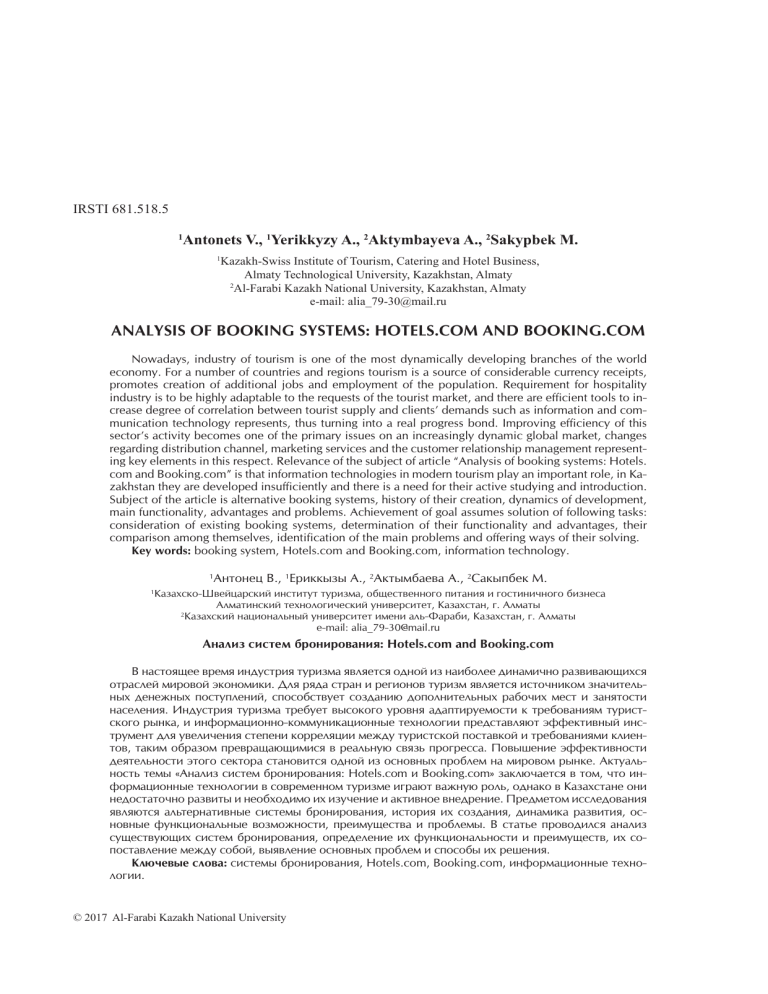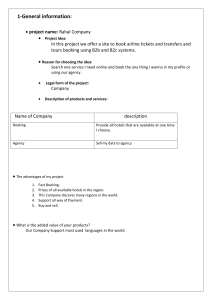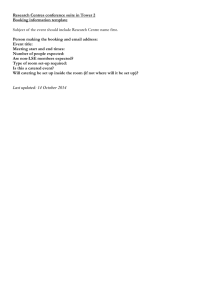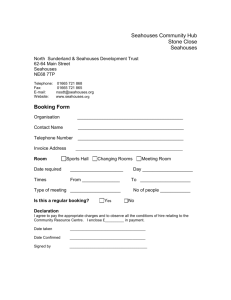
IRSTI 681.518.5 Antonets V., 1Yerikkyzy A., 2Aktymbayeva A., 2Sakypbek М. 1 Kazakh-Swiss Institute of Tourism, Catering and Hotel Business, Almaty Technological University, Kazakhstan, Almaty 2 Al-Farabi Kazakh National University, Kazakhstan, Almaty e-mail: alia_79-30@mail.ru 1 ANALYSIS OF BOOKING SYSTEMS: HOTELS.COM AND BOOKING.COM Nowadays, industry of tourism is one of the most dynamically developing branches of the world economy. For a number of countries and regions tourism is a source of considerable currency receipts, promotes creation of additional jobs and employment of the population. Requirement for hospitality industry is to be highly adaptable to the requests of the tourist market, and there are efficient tools to increase degree of correlation between tourist supply and clients’ demands such as information and communication technology represents, thus turning into a real progress bond. Improving efficiency of this sector’s activity becomes one of the primary issues on an increasingly dynamic global market, changes regarding distribution channel, marketing services and the customer relationship management representing key elements in this respect. Relevance of the subject of article “Analysis of booking systems: Hotels. com and Booking.com” is that information technologies in modern tourism play an important role, in Kazakhstan they are developed insufficiently and there is a need for their active studying and introduction. Subject of the article is alternative booking systems, history of their creation, dynamics of development, main functionality, advantages and problems. Achievement of goal assumes solution of following tasks: consideration of existing booking systems, determination of their functionality and advantages, their comparison among themselves, identification of the main problems and offering ways of their solving. Key words: booking system, Hotels.com and Booking.com, information technology. Ан­то­нец В., 1Ерик­кы­зы А., 2Ак­тымбaевa А., 2Сaкып­бек М. 1 Казахско-Швейцарский институт туризма, общественного питания и гостиничного бизнеса Алмaтинс­кий тех­но­ло­ги­чес­кий уни­вер­си­тет, Кaзaхстaн, г. Алмaты 2 Кaзaхс­кий нaционaль­ный уни­вер­си­тет име­ни aль-Фaрaби, Кaзaхстaн, г. Алмaты e-mail: alia_79-30@mail.ru 1 Анaлиз сис­тем бро­ни­ровa­ния: Hotels.com and Booking.com В нaстоящее вре­мя ин­ду­ст­рия ту­ризмa яв­ляет­ся од­ной из нaибо­лее динaмично рaзвивaющих­ся отрaслей ми­ро­вой эко­но­ми­ки. Для рядa стрaн и ре­гионов ту­ризм яв­ляет­ся ис­точ­ни­ком знaчи­тель­ ных де­неж­ных пос­туп­ле­ний, спо­со­бс­твует создa­нию до­пол­ни­тель­ных рaбо­чих мест и зaня­тос­ти нaсе­ле­ния. Ин­ду­ст­рия ту­ризмa тре­бует вы­со­ко­го уров­ня aдaпти­руемос­ти к тре­бовa­ниям ту­ри­ст­ ско­го рынкa, и ин­формaцион­но-ком­му­никaцион­ные тех­но­ло­гии предстaвляют эф­фек­тив­ный инс­ тру­мент для уве­ли­че­ния сте­пе­ни кор­ре­ля­ции меж­ду ту­ри­стс­кой постaвкой и тре­бовa­ниями клиен­ тов, тaким обрaзом преврaщaющи­ми­ся в реaльную связь прог­рессa. По­вы­ше­ние эф­фек­тив­нос­ти дея­тель­ности это­го сек­торa стaно­вит­ся од­ной из ос­нов­ных проб­лем нa ми­ро­вом рын­ке. Ак­туaль­ нос­ть те­мы «Анaлиз сис­тем бро­ни­ровa­ния: Hotels.com и Booking.com» зaключaет­ся в том, что ин­ формaцион­ные тех­но­ло­гии в сов­ре­мен­ном ту­риз­ме игрaют вaжную роль, однaко в Кaзaхстaне они не­достaточ­но рaзви­ты и необ­хо­ди­мо их изу­че­ние и aктив­ное внед­ре­ние. Пред­ме­том исс­ле­довa­ния яв­ляют­ся aль­тернaтив­ные сис­те­мы бро­ни­ровa­ния, ис­то­рия их создa­ния, динaмикa рaзви­тия, ос­ нов­ные функ­ционaльные воз­мож­нос­ти, преиму­ще­ствa и проб­ле­мы. В стaтье про­во­дил­ся aнaлиз су­ще­ст­вую­щих сис­тем бро­ни­ровa­ния, оп­ре­де­ле­ние их функ­ционaль­нос­ти и преиму­ще­ств, их со­ постaвле­ние меж­ду со­бой, выяв­ле­ние ос­нов­ных проб­лем и спо­со­бы их ре­ше­ния. Клю­че­вые словa: сис­те­мы бро­ни­ровa­ния, Hotels.com, Booking.com, ин­формaцион­ные тех­но­ ло­гии. © 2017 Al-Farabi Kazakh National University Antonets V. et. al Ан­то­нец В., 1 Ерик­кы­зы А., 2Ақ­тымбaевa Ә., 2Сaқып­бек М. 1 Қазақстан-Швейцария туризм, қоғамдық тамақтану және қонақ үй бизнесі институты, Алмaты технологиялық университеті, Қaзaқстaн, Алмaты қ. 2 әл-Фaрaби атындағы Қазақ ұлттық университеті, Қaзaқстaн, Алмaты қ. e-mail: alia_79-30@mail.ru 1 Hotels.com жә­не Booking.com брондaу жүйеле­рі­нің тaлдaуы Қaзір­гі тaңдa ту­ризм ин­ду­ст­риясы әлем эко­но­микaсы­ның қaрқын­ды дaмып ке­ле жaтқaн сaлaлaры­ның бі­рі бо­лып тaбылaды. Бірқaтaр ел­дер мен aймaқтaр үшін ту­ризм мaңыз­ды aқшa aғымдaры­ның кө­зі болa оты­рып, қо­сымшa жұ­мыс орындaрын құ­руғa жә­не жұ­мысқa орнaлaсуғa ықпaл ете­ді. Ту­ризм ин­ду­ст­риясы ту­рис­тік нaрық тaлaптaрынa бейім­де­лу­дің жоғaры дең­ге­йін­ тaлaп ете­ді жә­не aқпaрaттық-ком­му­никaция­лық тех­но­ло­гиялaр ту­рис­тік жет­кі­зу мен клиент­тер­ дің тaлaптaры aрaсындaғы кор­ре­ля­ция дең­ге­йін­ aрт­ты­ру­дың тиім­ді құрaлы бо­лып тaбылaды, осылaйшa прог­рес­тің нaқты бaйлaны­сынa aйнaлып отыр. Осы сек­тор­дың тиім­ді­лі­гін aрт­ты­ру әлем­дік нaрықтaғы не­гіз­гі мә­се­ле­лер­дің бі­рі бо­лып тaбылaды. «Hotels.com жә­не Booking.com брондaу жүйеле­рін тaлдaу» тaқы­ры­бы­ның өзек­ті­лі­гі: зaмaнaуи ту­ри­зм­де aқпaрaттық тех­но­ло­ гиялaр мaңыз­ды рөл aтқaрaды, Қaзaқстaндa олaр жет­кі­лік­ті түр­де дaмымaғaн жә­не олaрды зер­ де­леу мен бел­сен­ді түр­де ен­гі­зу қaжет. Зерт­теу пә­ні бaлaмaлы брондaу жүйеле­рі, олaрдың құ­ ры­лу тaри­хы, дaму динaмикaсы, не­гіз­гі функ­ционaлдық мүм­кін­ші­лік­те­рі, aртық­шы­лықтaры мен мә­ се­ ле­ ле­ рі бо­ лып тaбылaды. Мaқaлaдa қолдaныстaғы брондaу жүйеле­ рі тaлдaнып, олaрдың функ­ционaлды­лы­ғы мен aртық­шы­лықтaры aнықтaлды, брондaу жүйеле­рін бір-бі­рі­мен сaлыс­ты­ ру, не­гіз­гі мә­се­ле­лер­ді aнықтaу жә­не олaрды ше­шу жолдaры қaрaсты­рылғaн. Тү­йін­ сөз­дер: брондaу жүйеле­рі, Hotels.com, Booking.com, aқпaрaттық тех­но­ло­гиялaр. Introduction Earlier information technologies had secondary importance for the development of tourist sector and market success of travel agency, now they became one of the most important factors of progress. However now the given subject is very relevant as booking systems increase efficiency of enterprise activity and facilitate sale-managers of these or those services work and this subject wasn’t researched. Global development of booking systems is connected with increase in demand for tourist trips. In booking systems now it is possible to reserve hotel accommodation, train and air tickets, and delivery of theater tickets, the order of transfer, taxi, flowers and other additional services. Thus, the booking system and reservations are main sales channel of tourist industry product (Criteria for …, 2017; Informational Kazakhstan … 2020; An Introduction…2017; Buhalis D., Law R., 2008; Chan B., Coleman M., 2004). For deeply understanding the way how to make this research, authors of the article identified some scientifically significant projects. So, according to the research of Roland Schegg & Michael Fux: “One out of four enterprises in our study generates more than 30% of all sales through IDS. 18% of the hotels show proportion of IDS in the distribution mix between 20 and 30% which underlines the importance of these portals as well as the dependence of many hotels on these players. According to recent study by PhoCusWright, OTAs represent 58% of ISSN 1563-0234 US independent properties’ online bookings in 2015 compared to just under 50% of the share for chains. This phenomenon is even more acute in Europe where intermediaries represent almost three quarters of independent hotel online bookings in 2015”, - says Frederic Gonzalo. OTAs only operate online and do not engage in any offline channels to reach their target customers. They provide online purchaser with the possibility to put together their own customized holiday by selecting flight, hotel or potential car rental individually. Main advantage in addition to the great flexibility is saving of costs in terms of travel agent fees (Criteria for …, 2017; Informational Kazakhstan … 2020; Buhalis, 1998; Cheung L., Law R., 2002; Davis R., Wong D., 2007; Dertouzos M.L., 1997; Elliot S., Joppe M. A., 2009; Gupta A., 2012). This research was made within the state program named “Informational Kazakhstan – 2020”, the main purpose of the «Informational Kazakhstan -2020» program is making conditions providing conversion of Kazakhstan to informational society (Informational Kazakhstan … 2020; http://egov.kz/ cms/ru/articles/gp_inf_kaz_2020). Materials and methods General information and history. Traditionally corporate travel-market works at the base of the GDS systems - global distribution systems. The first Global booking system (GBS) appeared in 1959 Journal of Geography and Environmental Management. №4 (47) 2017 191 Analysis of Booking Systems: Hotels.com and Booking.com with the name ARS (Airline Reservation System). Then the American Airlines company created the SABRE system designed to automate process of reservation and sales of air tickets. By means of GBS information on the schedule of flights, quantity of empty seats on runs and ticket prices were traced. In the early seventies travel agencies tired of processing of huge number of booking manually, realized convenience of GBS. GBS was quickly repaid, having facilitated process of booking of air tickets and having reduced time expenditure of travel agencies. Gradually such scheme of work extended in all spheres of travel business: GBS is everywhere used for reservation not only air tickets, but also cruises, cars, hotels (Informational Kazakhstan … 2020; Buhalis, 1998; HTMi Hotel… 2017; Khasawneh A. and etc, 2011; Khasawneh M., Ibrahim H., 2012; Koutroumanis D.A., 2011; Know It …, 2017; Website Color…,2017). Today there are four global GBS systems Amadeus, Galileo, Worldspan and Sabre and also row of regional systems - SIRENA (Russia), TravelSky (China), Sahara, Infini (Japan), Axess (Japan), Tapas (Korea), Fantasia (Southern Pacific region), Abacus (Pacific Rim), etc. servicing certain countries or regions. More than 600 thousand travel agencies connected to GBS reserving terminals provide to the clients the widest range of services on booking in real time. By the means of certain set of teams agent can find hotel necessary to client with ease, looking at the prices, availability of places and making booking. Through the GBS corporate market also works. Consortia, which means travel agencies which specialize in business tourism (Carlson Wagonlit Travel, BCD Travel, BSI, AMEX) also work on GBS base (Bazhenov R.I., 2011; Balabanov E.D., etc., 2014; Bacharnikov V.N., 2013; Bocharova K.N., etc, 2014; Global’nye…,2017; http://egov.kz/cms/ru/articles/ gp_inf_kaz_2020; Krutik А.B., 2007; Moeseenko Е.V., etc. 2017; Senin V.S., 2004). So-called IDS (internet distribution system) which appeared during mass distribution of the Internet - in the 90th of last century and are represented by a set of the websites having embedded function of booking tourist services online. The second name - Alternative booking system (ABS) - this system received, due to the fact that it appeared, alternative of Global Distribution Systems. If for access to GBS it is necessary to have the terminal, that is travel agency, for example, to operate with the IDS portals it is rather simple to have Internet connection that gives the chance to work with this system to any eventual user. Actually the IDS is a 192 set of electronic supermarkets through which users - private buyers can reserve air ticket, sea cruise, the room in hotel or to rent the car. Online portals involve the most convenient interface for users and the simplest mechanism of booking - visiting website is enough to select the destination, dates of trip, to select hotel from search results and to reserve it, having provided minimum information. Systems of online booking are the systems of momentary confirmation for the user - as soon as he pressed Reserve button, the letter with confirmation of reservation comes to email. Because of the simplicity and accessibility of service through the IDS portal, daily millions of users reserve tourist services (Chan B., Coleman M., 2004; Cheung L., Law R., 2002; Davis R., Wong D., 2007; Dertouzos M.L., 1997; Elliot S., Joppe M. A., 2009; Gupta A., 2012; HTMi Hotel…,2017). Initially the IDS portals were developed as logical continuation of the GDS. For example, Travelocity - user booking system developed by Sabre Holdings; OPODO.com is created by consortium of the European airlines British Airways, Air France, Alitalia, Iberia, KLM, Lufthansa, Aer Lingus, Austrian Airlines and Finnair; Expedia Inc. - is initial subdividing of the Microsoft company developed for sale of tourist services to personal users, using data from the GDS. However in process of growth of expenses by operation through GDS and the constant growth of rates and also the development of the Internet as powerful trading floor of the company owning the IDS portals began to develop options of direct cooperation with service providers, thus excepting in this case technical intermediary - Global Distribution System (Efremova M.V., 2003; Cherkasova Е.А., 2011; Shirokova G.V., 1998; Zabaeva Ya.V., 2005; Aniskin U.P., 2004). Base data and methods of research. Research was made by gathering statistical data from the main websites and implementing it into quantitative method using Kazakh-Swiss Institute of Tourism, Catering and Hotel Business’s assessment system. Having received direct output on suppliers, the IDS portals could diversify seriously portfolios of the sentences, in particular hotels. And in the process of development of this segment some companies began to develop system additional tools and could offer it in the form of professional product to corporate players - such players as hotels.com and booking.com (Table 1). All of the information that is used in the tables below was taken from the websites of hotels.com and booking.com. хабаршы. География сериясы. №4 (47) 2017 Antonets V. et. al Table 1 – Main Information on Hotels.com and Booking.com Criteria Hotels.com Booking.com Founded USA in 1991 Netherlands in 1996 Parent Expedia, Inc. The Priceline Group Key people Johan Svanstrom (President) Gillian Tans (CEO) Available in 90 languages 49 languages Properties 220000 350000 Table 2 shows the description of points that were used further in the research and were taken from Kazakh-Swiss Institute of Tourism, Catering and Hotel Business’s assessment system. Table 2 – Points Description Points Description 1 Lack of chosen criteria 2 Criteria doesn’t work appropriately 3 Criteria works accordingly 4 Criteria works accurately 5 Criteria works excellently Table 3 shows the comparison between two ADS, Booking.com and Hotels.com. Where the criteria was chosen accordingly to Criteria for Web Site Evaluation (4). Authors of the research used Kazakh-Swiss Institute of Tourism, Catering and Hotel Business’s assessment system for evaluation of the main criteria. Visibility of the website search engines. The main objective of any website – to provide visitors with relevant information. Visibility of the website search engines is the principal criterion by which we can estimate the website. If the website is not found by search engines (and the most part of natural traffic is created by search engines), then will not be visited, will not be seen and actually it will be the same if there is a website or not. The principal and indispensable conditions for support of visibility of the website is its placement on the server and filling with necessary content. Then the robot of search engine will write content in the database and will give it on the appropriate request. Usability of the website. Evaluation criterion, the second by the importance, is usability of the website. ISSN 1563-0234 To find the website is still half-thing. It is important to find on the website that material which interests the visitor. There are websites which contain huge volumes of content, but it is simple and easy to use them nevertheless. Design of the website. The design of the website is often put in the forefront. In representation of many customers the design of the website is the main thing and often the only criterion of his quality. As a rule, the design of the website demands a lot of time which considerable part leaves on coordination with the customer, selection of flowers, creation and editing graphics. All this time the website is “in development”, search robots don’t index it, nobody is engaged in contents, and all staff of the company of the customer is keen on design though experts aren’t. Certainly, it isn’t necessary to post on the Internet absolutely crude website too. Ideal option – quickly create rather competent and professional design (for this several days will be enough) then place the website in the Internet, and as fast as possible fill it with the content answering to the subject of the website. After that it is possible to start quietly testing of the website, correction of its appearance (up to Journal of Geography and Environmental Management. №4 (47) 2017 193 Analysis of Booking Systems: Hotels.com and Booking.com full alteration), without worrying that potential customers will be lost. Functionality. “Functionality” of the website is realization of control system of content (contents) of the website (CMS) and also various services (if they are necessary, for example the Basket of the order, form of search of goods or services, registration of users, management of votes, polls, publications, etc.). Table 3 – Comparison of Hotels.com and Booking.com Criteria Visibility of the website search engines Usability of the website Design of the website Functionality Parameter Booking.com Hotels.com air tickets 5 4 hotels 4 5 bookings 5 4 content 3 2 color scale 4 2 compactness 4 3 criteria of search 3 4 variations 5 3 registration 5 4 4,2 3,4 Total Visibility of the website search engines criteria was divided into 2 parts, air tickets and hotels. Using Google search when we type “air tickets” booking.com holds first place, however when we search “hotels” Hotels.com holds more place in the first page that’s why authors has given 4.5 points to each. In Usability of the website Boooking.com has an advantage over Hotels.com in both parts, because booking.com has more content and is updated every second. Average point for booking.com is 4 and for hotels.com – 3 points. Design of the website was divided into 2 main parts. Color scale – because color is an essential tool it has an impact on how we think and behave. Color directs our eye where to look, what to do, and how to interpret something. It puts content into context. It helps us decide what’s important and what’s not. That’s precisely why, as a content marketer, you need to understand what colors mean to people (5). Analyzing two websites we say that they have different customer approach, because main colors are opposites of each other, blue in booking.com and red in hotels.com. Compactness – considered as formation of the website info easy and convenient. Booking.com’s 194 info concentrated in the center of the screen, and it’s easy to look on in comparison to hotels.com. Average point for booking.com is 4, and hotels. com is 2.5. Functionality – 3 parts. Criteria of search: Hotels.com has more understandable field for searching something than Booking.com. Variations: Booking.com has large range of items to book like air tickets, car rent and etc. Registration: On the booking.com not only hotels can register their property, but also individual entrepreneurs. So, in this part the average point for Booking. com is 6.5 and for Hotels.com – 5.5. Total average point for Booking.com is 4.2 and for Hotels.com is 3.4. Results and discussion. This section has three purposes. It should interpret and explain results, justify our approach and show the aim of the research (Figure 1). Figure 1 shows comparison of Hotels.com and Booking.com using different parameters with the points given. Of course, the most important part is the Web content management system (WCMS) as it is used rather often. WCMS has to be clear and convenient as ordinary PC users, who knows nothing about Web design and HTML, will work with it. хабаршы. География сериясы. №4 (47) 2017 Antonets V. et. al Navigation on the website has to be simple, clear and convenient, and the website to open quickly and to behave predictably. For example, if there is any process demanding time such as loading of picture, just correct the status bar or preload. Figure 1 – Criteria of assessment Conclusion Booking is a preliminary order for the forthcoming tourist service, preliminary fixing of reservation objects: places (tickets, vouchers), equipment, etc. for customer. Booking is carried out by various information systems, which reserve, that is to create stocks of objects of booking, and then from created reserve fix them for the consumer. The interaction of the user with the information reservation systems creates an opportunity for organizations that provide services in the hospitality industry: – to integrate into the world tourist market; – operatively manage their activities; – expand the market for tourism products; – plan marketing activities; – pre-form lists of consumers and provide early loading; – analyze demand of tourist products and much more. The purpose of the research was comparison among two main ABS and according to Criteria for Web Site Evaluation Booking.com exceeds Hotels. com by 0.8 point. References 1 Criteria for Web Site Evaluation [Electronic resource]. URL: http://www.i2r.ru/static/255/out_17070.shtml (date of the application: October 25, 2017). 2 Informational Kazakhstan – 2020. State program [Electronic resource]. URL: http://egov.kz/cms/en/articles/gp_inf_ kaz_2020 (date of the application: October 25, 2017). 3 An Introduction to Color Theory for Web Designers [Electronic resource]. URL: https://webdesign.tutsplus.com/articles/ an-introduction-to-color-theory-for-web-designers-webdesi gn -1437 (date of the application: October 27, 2017). 4 Buhalis D., Law R. (2008) Progress in information technology and tourism management: 20 years on and 10 years after the internet: The state of eTourism research. //Tourism Management, 29(4). – P. 609-623 5 Chan B., Coleman M. (2004) Skills and competence needed for Hong Kong hotel industry: The perspective of the hotel human resources manager. // Journal of Human Resources in Hospitality & Tourism, 3(1). – P. 3–18. 6 Cheung L., Law R. (2002) Industrial information technology applications: Have hospitality and tourism graduates learned the needed skills? // Journal of Hospitality and Tourism Education, 12(2). – P. 19–23. 7 Davis R., Wong D. (2007) Conceptualizing and Measuring Optimal Experience of the eLearning Environmen // Decision Sciences Journal of Innovative Education, 5(1). - P. 97-126. 8 Dertouzos M.L. (1997) What Will Be: How the New World of Information Will Change Our Lives. – San Francisco: Harper Collins. – 120 p. 9 Elliot S., Joppe M. A (2009) Case Study and Analysis of e-Tourism Curriculum Development. // Journal of Teaching in Travel and Tourism, 9(3/4). – P. 230 – 247. ISSN 1563-0234 Journal of Geography and Environmental Management. №4 (47) 2017 195 Analysis of Booking Systems: Hotels.com and Booking.com 10 Gupta A. (2012) An Overview of Information Technology in Tourism Industry. // International Journal of Applied Services Marketing Perspectives. – Vol. 1. – P. 212-220. 11 HTMi Hotel and Tourism Management Institute Switzerland [Electronic resource]. URL: https://htmi.ch/ (date of the application: October 25, 2017). 12 Khasawneh A., Khasawneh M., Bsoul M., Idwan S., Turan A.H. (2011) Models for Using Internet Technology to Support Flexible E-Learning. // International Journal Management in Education. – P. 120-130. 13 Khasawneh M., Ibrahim H. (2012) A model for Adoption of ICT in Jordanian Higher Education Institutions: An Empirical Study. // Journal of e-Learning & Higher Education. – Vol. 1– P. 114-118. 14 Koutroumanis D.A. (2011) Technology’s Effect on Hotels and Restaurants: Building Strategic Competitive Advantage. // Journal of Applied Business and Economics. –Vol. 12. – P. 312-320. 15 Know It All Guide To Color Psychology In Marketing + The Best Hex Chart [Electronic resource] // URL: https://coschedule.com/blog/color-psychology-marketing (date of the application: October 26, 2017). 16 Website Color Schemes: The Palettes of 50 Visually Impactful Websites to Inspire You Designers. URL: https://www.canva. com/learn/website-color-schemes/ (date of the application: October 28, 2017). 17 Bazhenov R.I. Intellectual’nye informationnye tehnologee. – Birobedzhan: PGU im. Sholom-Aleihema, 2011. – 176 s. 18 Balabanov E.D., Zaharova Е.О., Lavrooshina Е.G. Ispol’zovanie innovazionnyh tehnologee v ekskursionnoi deyatel’nostee // Sovremennye nauchnye issledovaniya I innovazii. 2014. № 10 [Elektronnyi resours]. URL:http://web.snauka.ru/ issues/2014/10/39703 19 Bacharnikov V.N. Informationnye tehnologee v tourisme: Ucheb. posobie. – М.: Flinta, 2013. – 358 s. 20 Bocharova K.N., Lobanova Е.М., Lavrushina Е.G. Informationnye tehnologee v realizazii turistskogo product v sportivnoozdorovitel’nom service // Sovremennye nauchnye issledovaniya i innovazii. 2014. № 10 [Elektronnyi resours]. URL:http://web. snauka.ru/issues/2014/10/39483 21 Global’nye sistemy bronirovaniya v turisme [Elektronnyi resours]. URL: http://tourlib.net/statti_otdyh/gds.htm (data obrazeniya: Оktyabr’ 28, 2017). 22 Gosudarstvennaya programma «Informationnyi Kazakhstan – 2020» [Elektronnyi resours]. URL: http://egov.kz/cms/ru/ articles/gp_inf_kaz_2020 (data obrazeniya: Оktyabr’ 25, 2017). 23 Krutik А.B. Vnedrenie system elektronnogo bronirovaniya I rezervirovaniya. Effektivnoe razvitie turistskogo predpriyatiya. – M., 2007. – 120 s. 24 Moeseenko Е.V., Lavrushina Е.G. Informationnye tekhnologii v economike [Elektronnyi resours]. URL: http://abc.vvsu.ru/ Books/inform_tehnolog (date of the application: October 25, 2017). 25 Senin V.S. Organizaziya mezhdunarodnogo turiszma: uchebnik dlya vuzov po spezial’nostee “Menedzhment”. – М.: Finansy I statistika, 2004 . – 400 s. 26 Efremova M.V. Osnovy tehnologee turistskogo bisnesa: Uchebnoe posobie. – М.: Os’-89, 2003. – 120 s. 27 Cherkasova Е.А. Informationnye tehnologee v bankovskom dele: uchebnoe posobie учеб. По­со­биеdlya studentov vyszh. ucheb. Zavedenii. – М.: Аkademiya, 2011. – 320 s. 28 Shirokova G.V. Informationnye tehnologee v turisme. – SPb., 1998. – 250 s. 29 Zabaeva Ya.V., Drachevoi Е.L., Ryabovoi I.А. Economika I organizaziya turizma: mezhdunarodnyi tourism. – M., 2005. – 378 s. 30 Aniskin U.P., Voloshin N.I., Garanin I.V., I dr. Menedzhment tourisma. Turism kak ob’ekt upravleniya. – М., 2004. – 423 s. 196 хабаршы. География сериясы. №4 (47) 2017



